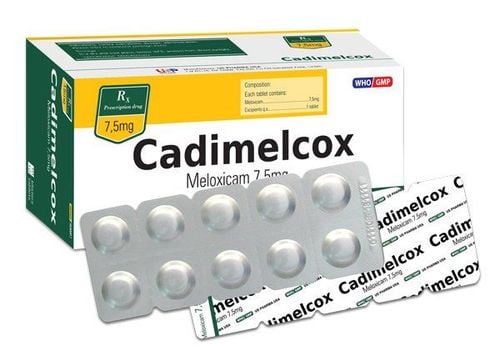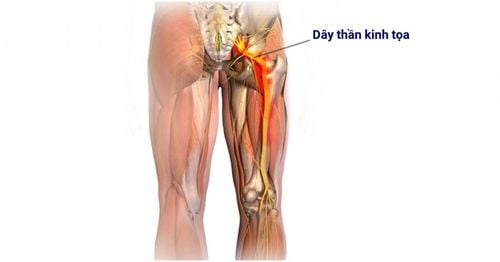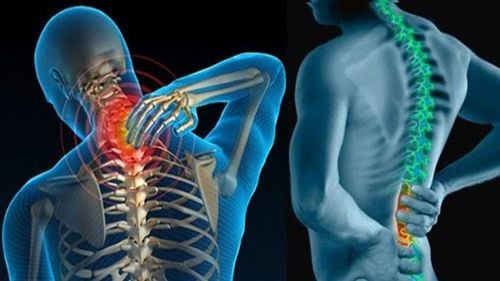This is an automatically translated article.
Neck and shoulder pain is increasingly common not only among sports people but also workers, public employees, office workers, students - students and housewives. Nerve pain in the neck can be a manifestation of many diseases from common to severe such as: herniated disc, cervical spondylosis, tumor. Therefore, it is necessary to understand the cause of cervical nerve pain in order to have an appropriate treatment.
1. Identify nerve pain in the neck
For a variety of reasons, nerves in the neck area can become compressed acutely or chronically, causing problems in this area. Common clinical symptoms in patients are:
Neck pain: Especially when bending, leaning or turning the neck to the left or right, it is difficult. The pain often appears when sitting for a long time, driving long distances with intense intensity, making the patient extremely uncomfortable; Pain from the shoulder to the arm, forearm, hand and fingers: This pain is very specific and can be felt by the patient, can be drawn along the pain line (following the sensory band of the nerve root being pinched). squeeze); Neck fatigue, stiff neck: Also a sign of concern, many patients complain about causing headaches, dizziness and trouble sleeping; Muscle weakness, rapid muscle atrophy: The patient has signs of nerve root damage, atrophy of the biceps muscle, atrophy of the triceps or interstitial muscle atrophy of the hand; Dizziness, dizziness, ringing in the ears ... due to the reduced amount of blood pumped to the brain. Every time you are active, some pain increases, even when you sneeze, you feel pain. Nerve pain in the neck often presents with a variety of symptoms that come on suddenly. Then it can go away quickly in a short time or for a long time if the patient has spinal diseases. At this time, the pain is more severe, can spread to the head, down the arm or fingers, causing sensory disturbances, numbness and difficulty moving.

Có nhiều cách nhận diện đau dây thần kinh ở cổ
2. Causes of nerve pain in the neck
There are 2 main causes of nerve pain in the neck and shoulders:
2.1. Physiological causes Physiological neuropathic pain mainly comes from daily activities and working habits such as: Sitting for too long in one place, sitting in the wrong position, sudden strong neck bending, overload due to work or have to carry heavy objects on their shoulders for long periods of time.
2.2. Pathological causes Age factors can lead to the aging process of bones and joints. Diseases causing nerve pain in the neck such as: herniated disc, cervical spondylosis, inflammation, cervical spondylosis, malformations, congenital torticollis, tuberculosis, cancer... The neck and shoulder area is pinched, leading to aching pain, numbness throughout the neck and shoulder area, spreading down the arm. The diseases that compress the cervical scapula often appear in the cervical vertebral column in front of the spinal cord, in the order of: pathological cervical disc herniation, post-traumatic cervical disc herniation and cervical spondylosis. Most cases only compress one nerve root and affect only one side of the neck, shoulder, and arm pain. However, there are still cases of patients with 2 stages of disease with 2 painful nerve roots on the same side.

Bệnh đau dây thần kinh ở cổ thường có các biểu hiện đa dạng
3. Prevention of cervical neuralgia
To prevent and limit nerve pain in the neck, people need to pay attention to some of the following activities:
Do not sit and work for too long at the desk or computer, every 30 minutes should stand up to perform. movement movements of the cervical spine, shoulders and hands; Keep your neck straight, sit correctly when studying, working, reading or typing, avoid bending your neck for too long; Limit the use of high head pillows to read books or watch TV because it will affect the posture of the cervical spine. Should put a low pillow at the nape of the neck when sleeping, leaning on a point suitable for the physiological curvature of the neck when reading, watching TV...; Regularly practice gentle movements such as arching your neck, bowing your head forward, tilting your head back, tilting your head to the left and right, turning your head and neck, bending your neck up and down... will prevent diseases; If you have degenerative disc disease, you should not break or shake your neck because this will create momentum for the disc to herniate out and make the disease worse. When you have neck and shoulder pain, you should take time to rest, limit vigorous exercise, supplement with some vitamins and minerals, massage gently to relax muscles and reduce neck and shoulder pain. Attention in daily activities and exercises will help you prevent nerve pain in the neck - shoulder - back of the neck. In case of problems with nerve pain in the neck, patients can go to Vinmec International General Hospital to be examined and treated by doctors. Vinmec has a team of experienced neurologists, a system of modern medical equipment that meets international standards for high efficiency in diagnosis and treatment, and is trusted and chosen by a large number of patients.
Please dial HOTLINE for more information or register for an appointment HERE. Download MyVinmec app to make appointments faster and to manage your bookings easily.













